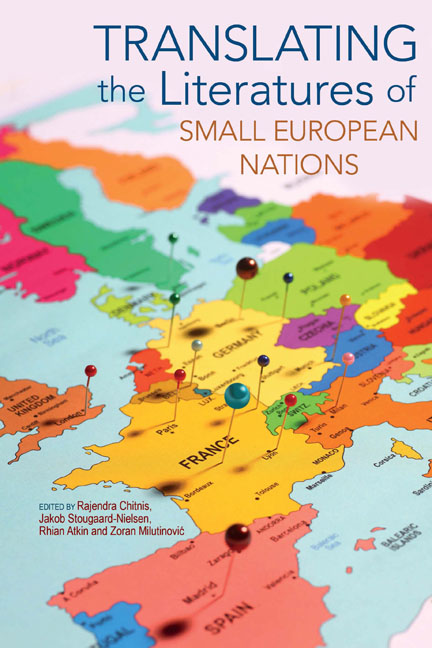Book contents
- Frontmatter
- Contents
- Acknowledgements
- Introduction
- 1 The Global Presentation of Small National Literatures: South Slavs in Literary History and Theory
- 2 Translators as Ambassadors and Gatekeepers: The Case of South Slav Literature
- 3 Supply-driven Translation: Compensating for Lack of Demand
- 4 Literature as Cultural Diplomacy: Czech Literature in Great Britain, 1918–38
- 5 Exporting the Canon: The Mixed Experience of the Dutch Bibliotheca Neerlandica
- 6 Creative Autonomy and Institutional Support in Contemporary Slovene Literature
- 7 Strategies for Success? Evaluating the Rise of Catalan Literature
- 8 Gender, Genre and Nation: Nineteenth-century Swedish Women Writers on Export
- 9 Translating as Re-telling: On the English Proliferation of C.P. Cavafy
- 10 Criminal Peripheries: The Globalization of Scandinavian Crime Fiction and Its Agents
- 11 Literary Translation and Digital Culture: The Transmedial Breakthrough of Poland's The Witcher
- 12 Towards a Multilingual Poetics: Self-translation, Translingualism and Maltese Literature
- 13 Does Size Matter? Questioning Methods for the Study of ‘Small’
- Coda: When Small is Big and Big is Small
- Index
13 - Does Size Matter? Questioning Methods for the Study of ‘Small’
- Frontmatter
- Contents
- Acknowledgements
- Introduction
- 1 The Global Presentation of Small National Literatures: South Slavs in Literary History and Theory
- 2 Translators as Ambassadors and Gatekeepers: The Case of South Slav Literature
- 3 Supply-driven Translation: Compensating for Lack of Demand
- 4 Literature as Cultural Diplomacy: Czech Literature in Great Britain, 1918–38
- 5 Exporting the Canon: The Mixed Experience of the Dutch Bibliotheca Neerlandica
- 6 Creative Autonomy and Institutional Support in Contemporary Slovene Literature
- 7 Strategies for Success? Evaluating the Rise of Catalan Literature
- 8 Gender, Genre and Nation: Nineteenth-century Swedish Women Writers on Export
- 9 Translating as Re-telling: On the English Proliferation of C.P. Cavafy
- 10 Criminal Peripheries: The Globalization of Scandinavian Crime Fiction and Its Agents
- 11 Literary Translation and Digital Culture: The Transmedial Breakthrough of Poland's The Witcher
- 12 Towards a Multilingual Poetics: Self-translation, Translingualism and Maltese Literature
- 13 Does Size Matter? Questioning Methods for the Study of ‘Small’
- Coda: When Small is Big and Big is Small
- Index
Summary
My sisters: But what can literature do?
Or rather: what can words do?
(New Portuguese Letters)Ok, one last time. These are small, but the ones
out there are far away. Small… far away.
(Father Ted)Discourses that construct the world into binary opposites of centre and periphery, small and large, are so prevalent that, as Venuti (1998, 67–68) observes, they must be a major contributing factor to the fixation and reproduction of stereotypes about cultures, at least in the anglosphere. With their focus on ‘size’, theoretical discussions of the translation of the literatures of European nations deemed ‘small’ risk reproducing and reinforcing the very hegemonic systems that they seek to counter. There remains significant work to be done to examine thoroughly the decision-making patterns that lead to the promotion and perpetuation of certain views about given countries, and the exclusion of other voices that do not support those views. This chapter contributes to the detailed exploration of what is translated, by whom and how, extending the disciplinary boundaries of the discussion about the circulation of literatures in translation to incorporate approaches from social and gender studies. In so doing, I propose a reinvigorated qualitative
My warmest thanks are due to David Frier, Rachel Haworth, Tilmann Altenberg, Céire Broderick and Carol O’Sullivan for their willingness to read, comment on and debate at length the ideas contained in this article.
approach that might be a means of not only identifying the imbalances of power between the literatures and cultures of nations perceived as ‘small’ or ‘large’, but also exploring where and how those imbalances come about and thus finding ways to illuminate and even alter the hegemonic culture of the centre (Venuti, 1998, 4).
Any discussion of the processes, pathways and networks through which the literatures of ‘small’ European nations come to be translated is a discussion about power. The project from which this book arises tacitly acknowledges the cultural hegemony of certain countries or languages, and opens a dialogue with the fields of world literature (a field that is dominated by perspectives from Anglo-American and French academia) and book history, as well as translation studies.
- Type
- Chapter
- Information
- Translating the Literatures of Small European Nations , pp. 247 - 266Publisher: Liverpool University PressPrint publication year: 2019



